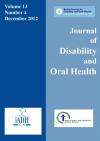Journal of Disability and Oral Health

- Cover Date:
- December 2012
- Print ISSN:
- 1470-855
- Vol:
- 13
- Issue:
- 4
Editorial
Editorial
Developing an academic base for Special Care Dentistry In the United Kingdom (UK), there has been development of an Academic Clinical Fellowship in Special Care Dentistry. This provides an exciting opportunity for both the specialty and postgraduate trainees. Special Care Dentistry (SCD) was formally recognised as a specialty in the UK by the General Dental Council in 2008 (GDC 2012). The wide spectrum of disability and impairment presents the clinician on a daily basis with variety of challenges. The majority of patients will receive care in a primary care setting, whilst a number require secondary care support. As such, care should be provided in the right place by the right person in the right time (DoH, 2011). Consequently, a strong sense of teamwork is essential to ensure reliable and safe care for this diverse group of people. The specialty embodies a holistic approach to providing the best healthcare possible for vulnerable patients with high need (BSDH, 2006), underpinned by quality and consistency. An academic base is vital for any specialty. Academics provide an important connection with universities and are able to both support the establishment of and influence undergraduate and postgraduate training. Additionally, academics at the forefront of research create an essential evidence base for other members of the specialty. As a new specialty, SCD will benefit greatly from the development of an academic base. Expansion of the specialty will be aided through academics securing the evidence to opitmise the delivery of best practice, whilst maximising treatment outcomes for our patient groups. Furthermore, a strong academic base will enable the continuing securement of funding for the specialty. The National Institute for Health Research in the North Western Deanery, England, has funded the development of an Academic Clinical Fellow (ACF). This is a specialty training post that incorporates academic training. The posts are for a maximum of three years. Clinical specialty training accounts for 75% of the training programme, with the remaining time spent undertaking academic training. Success in securing external funding for a PhD is deemed the end point of the ACF post (NIHR, 2012). An ACF post enables the trainee to steadily build their academic training through protected academic time, and supervision. Trainees normally complete a part time Master of Research (MRes). This equips them with the skills needed to partake in research, experience in leading their own research projects and to undertake a PhD. Furthermore, an integral part of academic training is education, with the posts allowing the ACF an opportunity to lecture and supervise undergraduate dental students. The development of Academic Clinical Fellowships could lead to Academic Consultants in Special Care Dentistry being associated with every dental school, not just in the UK but globally.
- Article Price
- £15.00
- Institution Article Price
- £
- Page Start
- 137
- Page End
- 138
- Authors
- Vanita Brookes, Stephanie King
Articles from this issue
- Title
- Pg. Start
- Pg. End
- An audit of the dental assessment of head and neck cancer patients and evaluation of a multi-disciplinary clinic
- 139
- 146
- An assessment of a service-learning placement programme in residential aged care facilities for final year dental hygiene students
- 163
- 167
